Most people think of cheating as a moral issue, but what about the health implications? Unfortunately, an affair can have serious consequences for your physical and emotional health. In this blog post, we will explore how cheating can damage your well-being. We will also discuss how to deal with the aftermath of infidelity and how to protect yourself from future hurt. Read on to learn more!
Effects of Cheating on Physical Health
The physical consequences of cheating are often the most surprising to people. After all, if you’re just being unfaithful emotionally, how could that possibly hurt your health? But the truth is, cheating can take a significant toll on your body – both mentally and physically.
Mentally, the stress of keeping up a double life can be incredibly taxing. Cheating takes an emotional toll that can lead to anxiety and depression. And when you’re stressed out, your body responds by releasing cortisol – the “stress hormone.”
Cortisol has been linked to everything from weight gain to heart disease. So even if you’re not technically “cheating” on your diet or exercise regimen, the stress of cheating can still make it harder to maintain a healthy lifestyle.
Studies have shown that people who cheat are more likely to suffer from headaches, stomach problems, and even insomnia. And all of those health issues can lead to even more stress, creating a vicious cycle of poor health.
Effects of Cheating on Mental Health
It’s no secret that getting caught cheating can be devastating. Not only does it ruin relationships, but it can also wreak havoc on your mental health. Infidelity can cause a whole host of problems, including anxiety, depression, and even post-traumatic stress disorder (PTSD).
If you’ve been cheated on, you might feel like you’re not good enough or that you’ll never be able to trust anyone again. Unfortunately, these are all valid feelings that can lead to some serious mental health issues.
Depression and anxiety are two of the most common mental health problems caused by cheating. Depression can cause you to lose interest in activities you used to enjoy, make it difficult to concentrate, and even lead to thoughts of suicide. On the other hand, anxiety can make it hard to sleep, eat, or focus on anything else.
PTSD is another serious mental health condition that can be caused by cheating. If you’ve been cheated on, you might have flashbacks of the event or feel like you’re constantly on edge. You might also avoid situations or people that remind you of what happened.
In fact, studies have shown that being cheated on can actually be more traumatic than experiencing a death in the family or witnessing a violent crime. This can be explained by the fact that it feels like a violation of trust when you’re cheated on. And since trust is such an essential part of any relationship, its loss can be devastating.
***
How to protect yourself from getting cheated on in the future
If you’re in a relationship, it’s essential to be aware of the signs that your partner may be cheating on you. Here are some red flags to watch out for:
-Your partner is suddenly spending more time away from home or out with friends without you.
-You notice that your partner is unusually secretive about their phone or computer usage.
-Your partner starts dressing differently or taking more care with their appearance than they used to.
-You feel like your partner is emotionally distant from you or seems uninterested in your life.
If you notice any of these signs, it’s important to talk to your partner about what’s going on. Cheating can have a significant impact on your well-being, both emotionally and physically.
Conclusion
So, if you’re considering cheating on your partner, think about how it might affect your mental health. It’s not worth risking your mental well-being for a moment of pleasure. Infidelity can have severe and long-lasting consequences far from being “just a mistake.” Choose wisely.
And if you’ve been cheated on, know that it’s not your fault and that you are not alone. There is help available if you’re struggling to cope with the aftermath of infidelity. Reach out to a therapist or counselor who can support you



